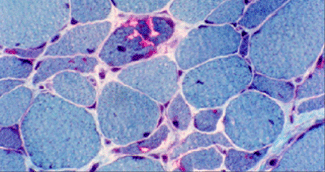Myopathies and celiac disease

Inflammatory myopathies are inflammatory infiltrates in the muscle. This group of diseases includes polymyositis, dermatomyositis, and inclusion-body myositis. Little is known about the cause and the etiopathogenic mechanisms of these myopathies, but it is believed to be an abnormal immune response by our bodies, which identify body parts as alien. In this particular case, the body parts are the skin and the muscle, though other parts, such as the lungs and the myocardium, may also be affected.
The research team observed that it is not a rare occurrence for various autoimmune diseases to exist in the same patient. Indeed, coeliac disease -caused by a reaction to gluten found in cereals- has been reported in patients with inflammatory myopathy, especially those with inclusion-body myositis.
Researchers at the Teaching Unit at the UAB's Vall d'Hebron Hospital have investigated these links by looking at coeliac patients whose cases suggest a similar immunopathogenic mechanism in coeliac disease and certain myopathies, as well as a common genetic substrate.
The scientists are considering the possibility that, at least in part, some inflammatory myopathies are a clinical expression of intolerance to gluten, though they point out the need for more studies to be carried out to confirm or support these findings. The results are particularly important in the case of inclusion-body myositis- for which there is no effective treatment- since we can now suggest that a gluten-free diet may improve the situation of a patient. This hypothesis must now be tested using immunosuppressants, as has been done with other extraintestinal manifestations of reactions to gluten.


